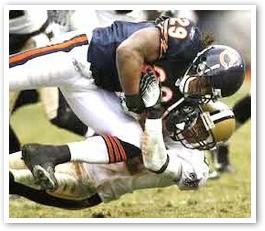by FATHER RAYMOND J. DE SOUZA for The National Post
The NFL knows something about rigging the system.

Yet, as is often the case with the NFL, things are not exactly how they appear. According to business Insider, when a fan buys NFL merchandise, 50% of the purchase price goes to the retailer, which is rather standard. Of the remaining 50% wholesale price, the NFL takes a quarter of that as a royalty ($12.50 on a $100 item). In the case of breast cancer Awareness gear, the NFL then donates 90% of that royalty ($11.25) to the American cancer Society.
All of which might seem generous enough; the NFL is giving most of its share. Except that one of the most popular places to buy NFL merchandise is on the NFL’s own website or in football stadia and team shops, in which case the NFL and its teams are the retailers, and therefore are entitled to the retailer’s 50% take of the entire price (which would be $50 in the case of a $100 item). In the example above, the American cancer Society would still get its $11.25, but that would be less than a quarter of the NFL’s total take. Given the propensity of the NFL to create alternative uniforms in order to sell more merchandise, a cynical sort might suspect that the breast cancer campaign is less a public-spirited initiative than a clever rigging of the system for the NFL’s benefit.
The NFL knows something about rigging the system. The NFL headquarters over on Park Avenue is an impressively luxurious, high-tech six-storey complex. It doesn’t appear to be the HQ of a non-profit institution, like, for example, Christ Church Methodist a few blocks up the street. (NFL commissioner Roger Goodell earns $29-million a year.) On Sundays, Christ Church offers a dinner for the homeless. On Sundays, the NFL receives billions for the broadcast of its games. both the Christ Church homeless dinner and the NFL are tax-exempt non-profits. In 1966, the NFL’s lobbyists got congress to add “professional football leagues” to the category of tax-exempt charitable institutions, like food banks and orphanages. In America, nothing is too unjust, nothing is too craven, nothing too brazen, when it comes to shovelling public dollars and privileges to the millionaires who play football and the billionaires who hire them.
The opening and closing chapters show the game at its best — deliberately so, Easterbrook tells us, for the chapters between are a tale of corruption, deception and exploitation.
I am a football fan. So too is Gregg Easterbrook, a gifted journalist and noted author on public policy, who writes the best weekly football column for ESPN.com, “Tuesday Morning Quarterback.” His recent book, The King of Sports: Football’s Impact on America, chronicles the game he loves. The opening and closing chapters show the game at its best — deliberately so, Easterbrook tells us, for the chapters between are a tale of corruption, deception and exploitation. Abuse of political power by the NFL; abuse of taxpayers by the super-rich; abuse of young men by college football programs; abuse of health, from concussions to obesity: For those who love football, it is a sobering look at the unlovely parts of our game.
“Until public attitudes change, those at the top of the pro football pyramid will keep getting away with whatever they can,” Easterbrook writes. “This is troubling not just because average people are taxed to provide subsidies, and special government favours are granted so a small number of NFL owners and their families can live in great wealth, as modern feudal lords and ladies. It is troubling because athletics are supposed to set an example — and the example being set is one of selfishness. Football is America’s game. Should the favorite sport of the greatest nation on earth really be one whose economic structure is based on inequality and greed?”
America is no longer the greatest nation on earth, thanks to its decadent culture and various other reasons that have nothing to do with football. But the fraudulent excesses of football are a fitting symbol for all the rest — because the NFL has become the fallen nation’s bread and circuses — not just in October, but year round.
ACKNOWLEDGEMENT
Father Raymond J. de Souza, “How football became a symbol of American decadence.” National Post, (Canada) October 31, 2013.
Reprinted with permission of the National Post and Fr. de Souza.
THE AUTHOR
Father Raymond J. de Souza is chaplain to Newman House, the Roman Catholic mission at Queen’s University, Kingston, Ontario. He is the Editor-in-Chief of Convivium and a Cardus senior fellow, in addition to writing for the National Post and The Catholic Register. Father de Souza’s web site is here. Father de Souza is on the advisory board of the Catholic Education Resource Center.
Copyright © 2013 National Post

